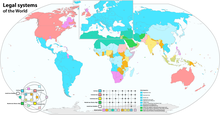Joseph Dainow
Dainow was the founding editor of the Louisiana Law Review that began publishing several issues per year in 1938.
During World War II, Major Joseph Dainow served in the Judge Advocate General's Corps, United States Army.
Dainow went on to work on a PhD in law at the University of Dijon in France and in 1931 he received the degree Docteur en Droit.
Following this he was in private law practice in Montreal, but he was a scholar and wanted to pursue an academic career of research and teaching.
Civil law is based on comprehensive, continuously updated legal codes that specify all matters that can be brought before a court.
A number of professors at Northwestern urged Dainow to consider Louisiana, as it would provide an opportunity to fully utilize his background and training in the civil law.
In 1945, Robert H. Jackson was absent from the Supreme Court to be U.S. Chief of Counsel for the prosecution of Nazi war criminals at the Nuremberg Trials.
His trial brief "1933-1936 Preparation for Aggression" assembled evidence showing that Nazi conspirators decided "the Treaty of Versailles must definitely be abrogated and specific plans were made by them and put into operation by 7th March, 1936.
"[4] On Nov 27, 1945, the sixth day, Dainow appeared in court as the assistant to Associate Trial Counsel Sidney S. Alderman.
On December 10, 1945, Alderman concluded his presentation on "Aggressive War" by saying, "I hope the Tribunal will allow me to express my deep sense of obligation to Commander Sidney J. Kaplan, section chief, and to the members of his staff, who did the yeoman work necessary to assemble and prepare these materials that I have presented.
In 1938 Dainow was asked to become the founding Faculty Editor of the Louisiana Law Review that published four issues per year.
[8] This code was widely used by law students and was kept current by publishing small updates reflecting legislative changes.
[14] The institute under his direction produced and collaborated in publishing a number of significant works in the civil law field.



